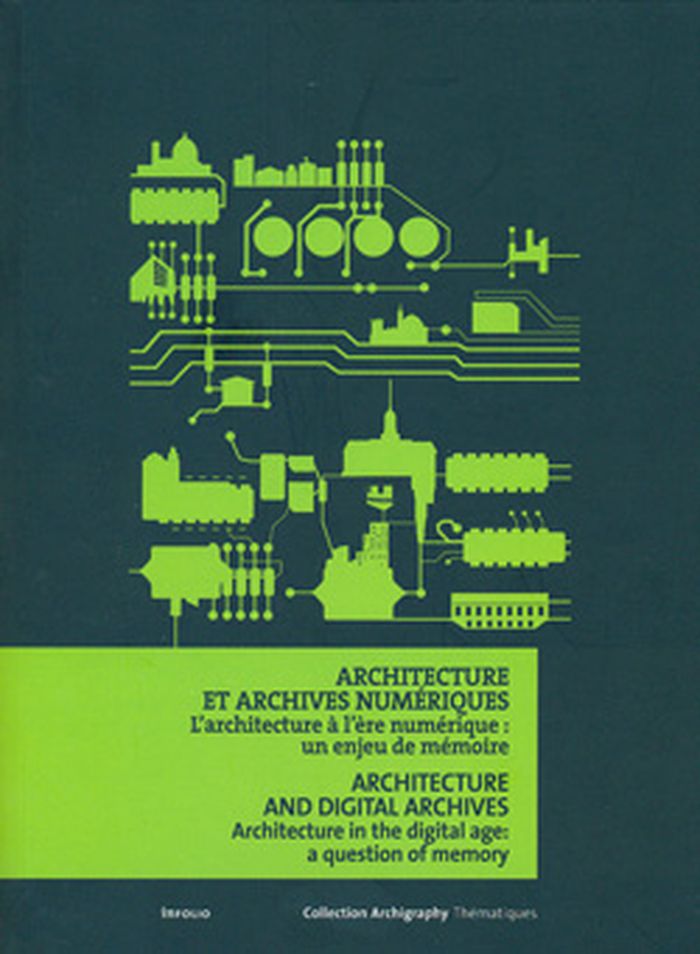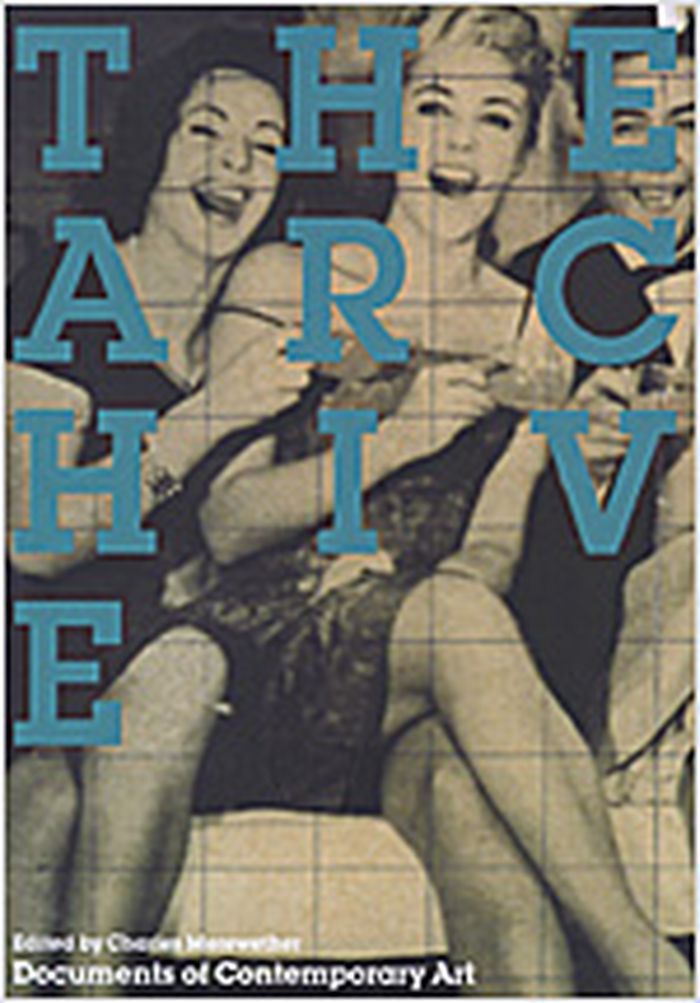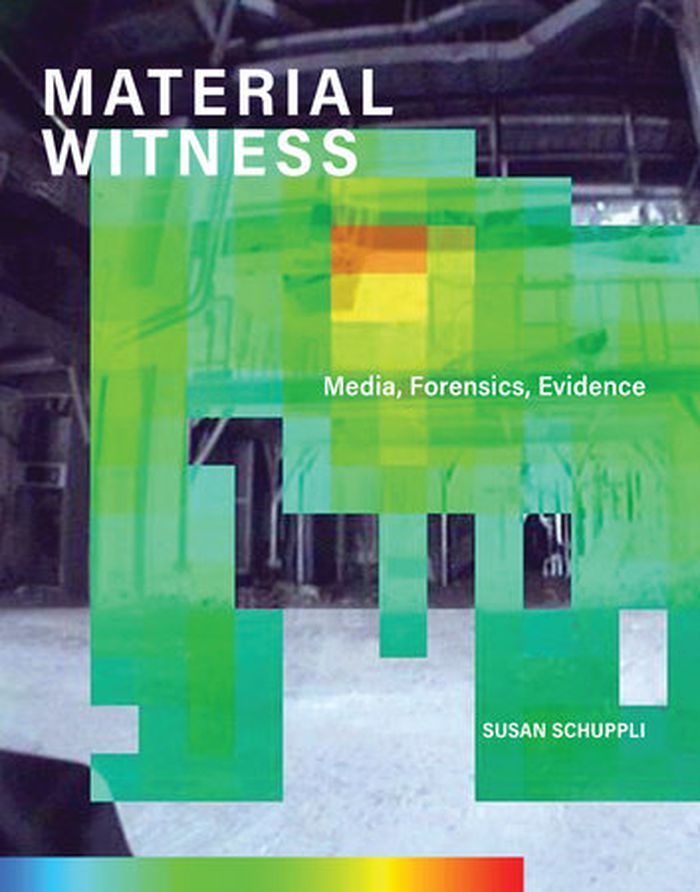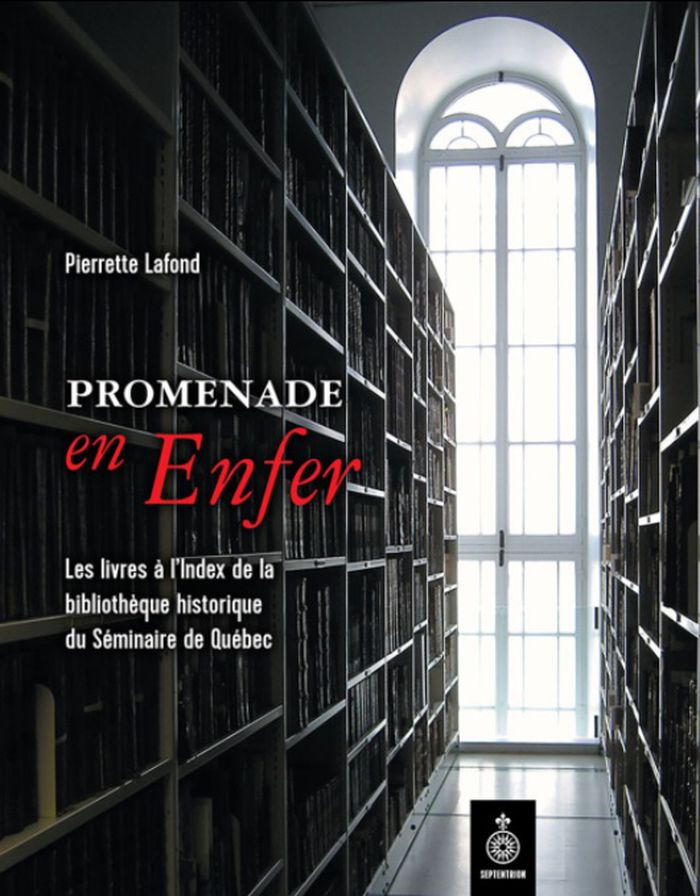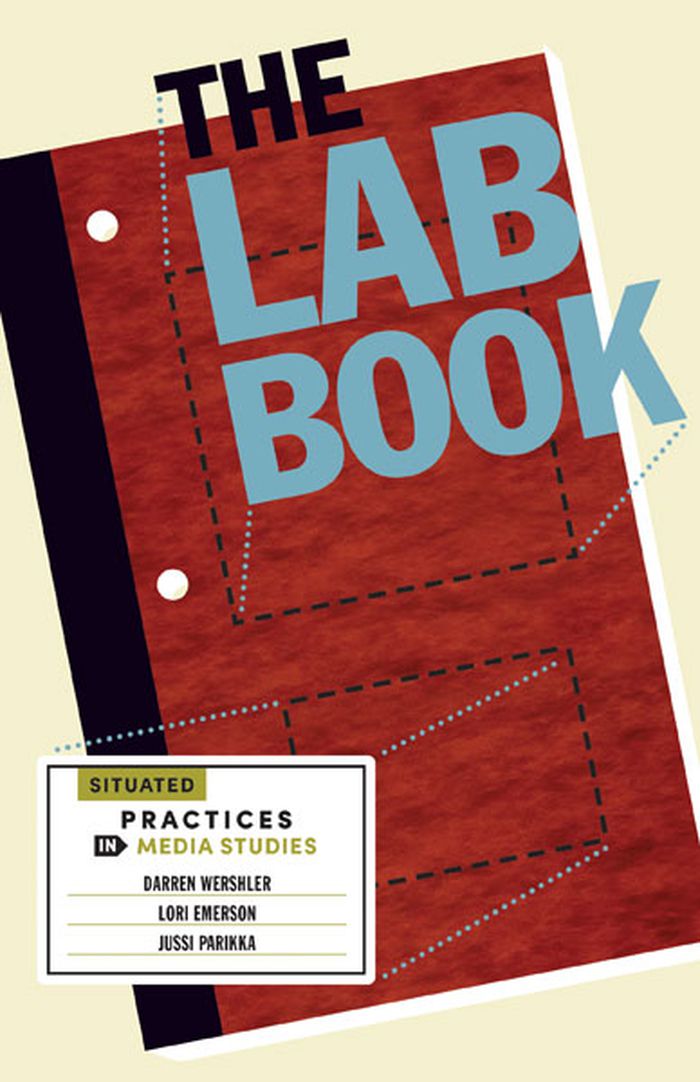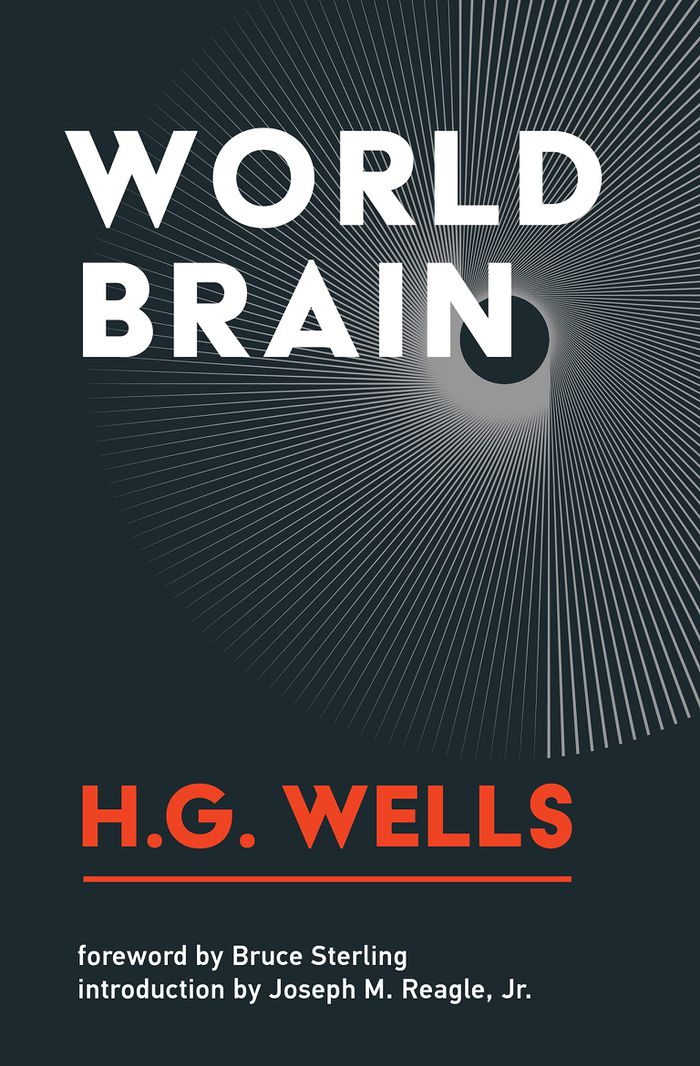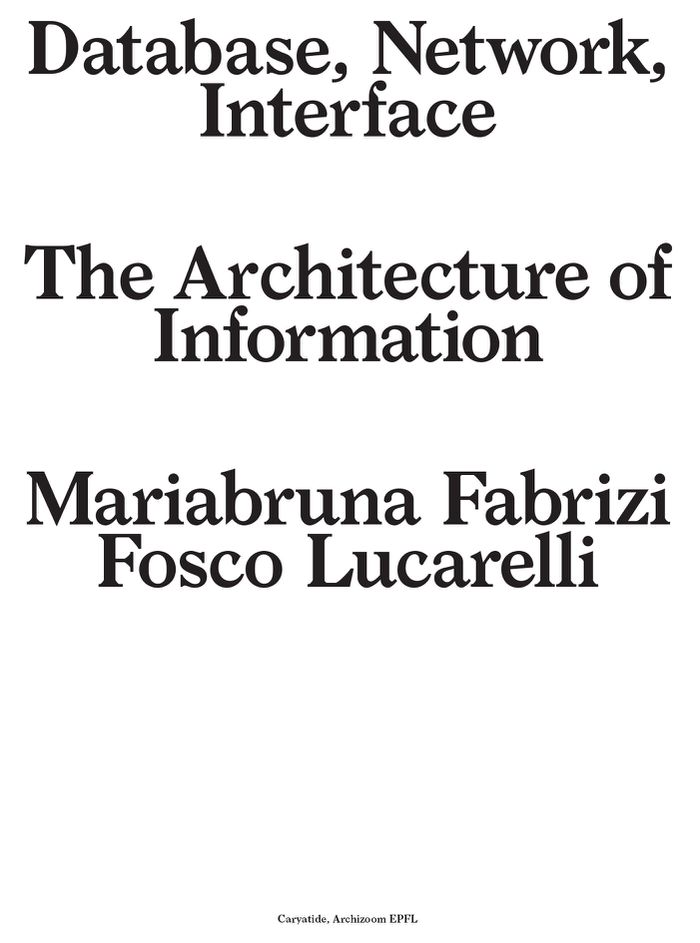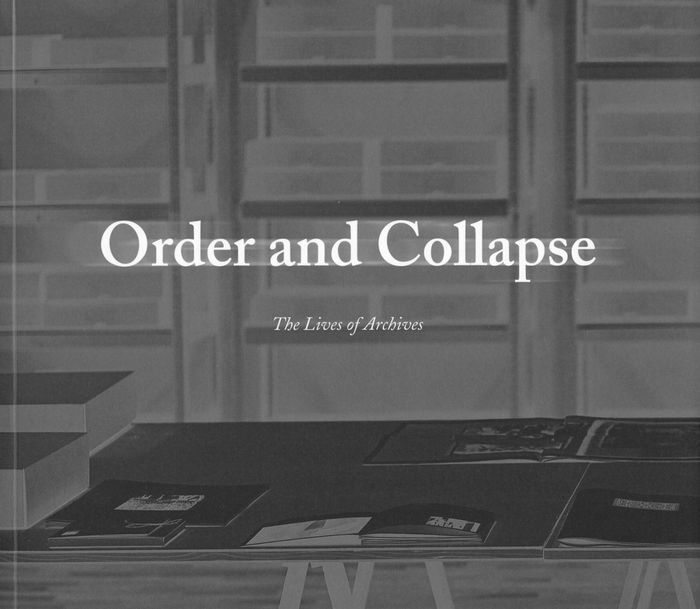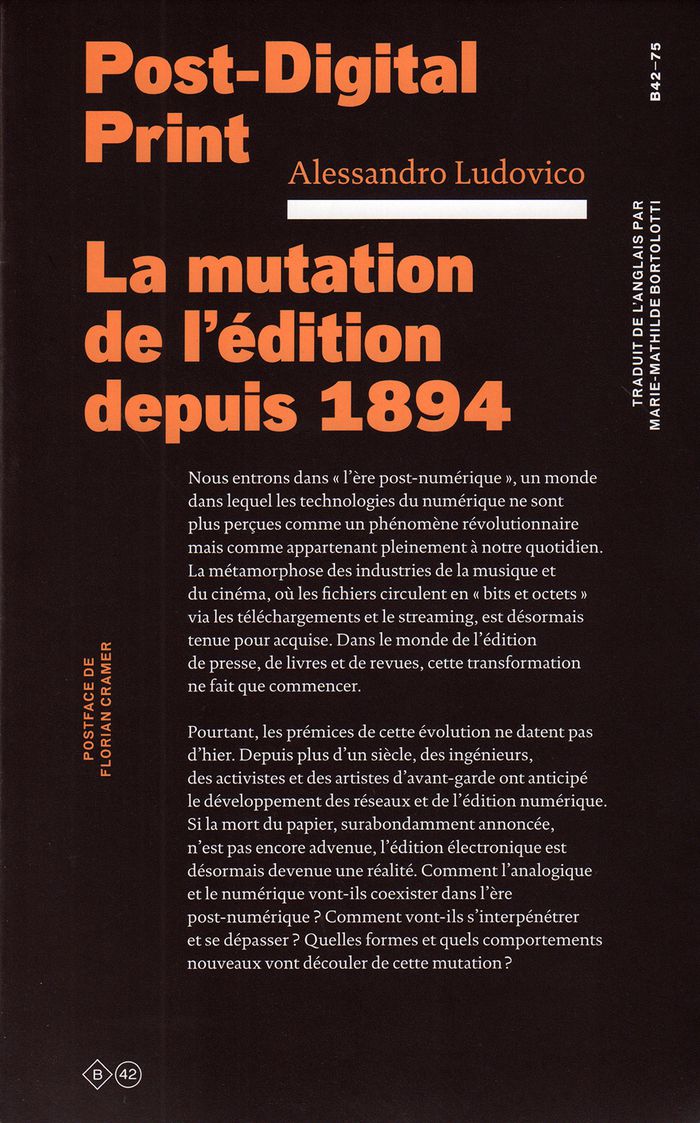livres
$31.95
(disponible sur commande)
Résumé:
L'architecture, son évolution comme sa connaissance, dépend en grande partie de la circulation et de la transmission dans l'espace et le temps d'une accumulation d'expériences, de règles ou de modèles. Voilà pourquoi ce livre examine les moyens de communication utilisés par les architectes occidentaux, de Vitruve à l'époque moderne, en montrant comment chaque média influe(...)
L'architecture à l'âge de l'imprimerie
Actions:
Prix:
$31.95
(disponible sur commande)
Résumé:
L'architecture, son évolution comme sa connaissance, dépend en grande partie de la circulation et de la transmission dans l'espace et le temps d'une accumulation d'expériences, de règles ou de modèles. Voilà pourquoi ce livre examine les moyens de communication utilisés par les architectes occidentaux, de Vitruve à l'époque moderne, en montrant comment chaque média influe sur les formes spécifiques de la pensée architecturale et sur les modalités de la diffusion des savoirs.
livres
avril 2009, Paris
$56.95
(disponible sur commande)
Résumé:
Comment assurer une conservation pérenne et efficace des archives des architectes? Quelles sont les normes et les tendances actuelles? Les réflexions présentées dans cet ouvrage émanent d'architectes, d'archivistes et conservateurs, historiens d'architecture, de chercheurs et d'enseignants. Issus d'une dizaine de pays d'Europe, des États-Unis et du Canada.
février 2009
Architectures et archives numériques: l'architecture à l'ère numérique: un enjeu de mémoire
Actions:
Prix:
$56.95
(disponible sur commande)
Résumé:
Comment assurer une conservation pérenne et efficace des archives des architectes? Quelles sont les normes et les tendances actuelles? Les réflexions présentées dans cet ouvrage émanent d'architectes, d'archivistes et conservateurs, historiens d'architecture, de chercheurs et d'enseignants. Issus d'une dizaine de pays d'Europe, des États-Unis et du Canada.
$30.00
(disponible sur commande)
Résumé:
In the modern era, the archive--official or personal--has become the most significant means by which historical knowledge and memory are collected, stored, and recovered. The archive has thus emerged as a key site of inquiry in such fields as anthropology, critical theory, history, and, especially, recent art. Traces and testimonies of such events as World War II and(...)
novembre 2006, London / Cambridge
The archive: Documents of contemporary art
Actions:
Prix:
$30.00
(disponible sur commande)
Résumé:
In the modern era, the archive--official or personal--has become the most significant means by which historical knowledge and memory are collected, stored, and recovered. The archive has thus emerged as a key site of inquiry in such fields as anthropology, critical theory, history, and, especially, recent art. Traces and testimonies of such events as World War II and ensuing conflicts, the emergence of the postcolonial era, and the fall of communism have each provoked a reconsideration of the authority given the archive--no longer viewed as a neutral, transparent site of record but as a contested subject and medium in itself. This volume surveys the full diversity of our transformed theoretical and critical notions of the archive--as idea and as physical presence--from Freud's "mystic writing pad" to Derrida's "archive fever"; from Christian Boltanski's first autobiographical explorations of archival material in the 1960s to the practice of artists as various as Susan Hiller, Ilya Kabakov, Thomas Hirshhorn, Renée Green, and The Atlas Group in the present.
$54.00
(disponible sur commande)
Résumé:
In this book, Susan Schuppli introduces a new operative concept: material witness, an exploration of the evidential role of matter as both registering external events and exposing the practices and procedures that enable matter to bear witness. Organized in the format of a trial, 'Material witness' moves through a series of cases that provide insight into the ways in(...)
Material witness: Media, forensics, evidence
Actions:
Prix:
$54.00
(disponible sur commande)
Résumé:
In this book, Susan Schuppli introduces a new operative concept: material witness, an exploration of the evidential role of matter as both registering external events and exposing the practices and procedures that enable matter to bear witness. Organized in the format of a trial, 'Material witness' moves through a series of cases that provide insight into the ways in which materials become contested agents of dispute around which stake holders gather.
Promenade en Enfer
$29.95
(disponible sur commande)
Résumé:
Longtemps soumises à la censure ecclésiastique, certaines bibliothèques conservaient les ouvrages mis à l’Index dans un huis clos mythique nommé Enfer. La simple lecture d’une œuvre proscrite par l’Église pouvait entraîner la damnation éternelle de l’âme. La levée de l’Index dans les années 1960 a entraîné le démantèlement des sections logeant les livres interdits qui ont(...)
Promenade en Enfer
Actions:
Prix:
$29.95
(disponible sur commande)
Résumé:
Longtemps soumises à la censure ecclésiastique, certaines bibliothèques conservaient les ouvrages mis à l’Index dans un huis clos mythique nommé Enfer. La simple lecture d’une œuvre proscrite par l’Église pouvait entraîner la damnation éternelle de l’âme. La levée de l’Index dans les années 1960 a entraîné le démantèlement des sections logeant les livres interdits qui ont disparu tout en conservant leurs secrets. L’une des rares collections encore existantes des livres mis à l’Index, regroupant des centaines de volumes, se retrouve cependant dans la bibliothèque historique du Séminaire de Québec, fondé en 1663. Pierrette Lafond lève le voile sur ces ouvrages jugés immoraux, hérétiques ou dangereux, témoins silencieux de la censure pendant trois siècles et qui racontent un volet occulté de l’histoire morale et culturelle du Québec.
$41.99
(disponible sur commande)
Résumé:
Organized by interpretive categories such as space, infrastructure, and imaginaries, this volume uses historical and contemporary examples of how laboratories are fundamentally connected to changes in the contemporary university. The authors cover topics such as the evolution and delineation of lab-based communities, how labs’ tools and technologies contribute to defining(...)
décembre 2021
The lab book: situated practices in media studies
Actions:
Prix:
$41.99
(disponible sur commande)
Résumé:
Organized by interpretive categories such as space, infrastructure, and imaginaries, this volume uses historical and contemporary examples of how laboratories are fundamentally connected to changes in the contemporary university. The authors cover topics such as the evolution and delineation of lab-based communities, how labs’ tools and technologies contribute to defining their space, and a glossary of key hybrid lab techniques.
World brain
$33.95
(disponible sur commande)
Résumé:
In a series of talks and essays in 1937, H. G. Wells proselytized for what he called a "World Brain," as manifested in a World Encyclopedia--a repository of scientifically established knowledge--that would spread enlightenment around the world and lead to world peace. Wells, known to readers today as the author of "The War of the Worlds" and other science fiction(...)
World brain
Actions:
Prix:
$33.95
(disponible sur commande)
Résumé:
In a series of talks and essays in 1937, H. G. Wells proselytized for what he called a "World Brain," as manifested in a World Encyclopedia--a repository of scientifically established knowledge--that would spread enlightenment around the world and lead to world peace. Wells, known to readers today as the author of "The War of the Worlds" and other science fiction classics, was imagining something like a predigital Wikipedia. The World Encyclopedia would provide a summary of verified reality (in about forty volumes); it would be widely available, free of copyright, and utilize the latest technology. Of course, as Bruce Sterling points out in the foreword to this edition of Wells's work, the World Brain didn't happen; the internet did. And yet, Wells anticipated aspects of the internet, envisioning the World Brain as a technical system of networked knowledge (in Sterling's words, a "hypothetical super-gadget"). Wells's optimism about the power of information might strike readers today as naïvely utopian, but possibly also inspirational.
Database network interface
$59.95
(disponible en magasin)
Résumé:
Throughout human history, the library, the archive and the museum have embodied knowledge, information and collective culture to such an extent that it is possible to compare systems of information organisation with spatial and architectural typologies. The publication, conceived in the occasion of the exhibition at Archizoom (EPFL), dives into the relationship between(...)
octobre 2021
Database network interface
Actions:
Prix:
$59.95
(disponible en magasin)
Résumé:
Throughout human history, the library, the archive and the museum have embodied knowledge, information and collective culture to such an extent that it is possible to compare systems of information organisation with spatial and architectural typologies. The publication, conceived in the occasion of the exhibition at Archizoom (EPFL), dives into the relationship between architectural and digital culture beyond the pure rhetoric of the digital turn and the digital as architectural style. The hypothesis is that the notions of "database", "network" and "interface"—common in the field of information technology—could be related to architectural issues of a formal, compositional or symbolic nature, of which spatial arrangements, plans or façades are the expression. In this sense, the publication presents a selection of case studies highlighting the possible links between digital and non-digital cultural projects and their architectural counterparts.
$52.95
(disponible sur commande)
Résumé:
The normative order and authoritarian use of conventional archives has long been criticised. This volume investigates the digitally informed transformation and multiplication of archives today, in conjunction with the increase in both accessibility and the amount of data produced, stored, and circulated. Despite improved search capabilities, documents, photographs, and(...)
Order and collapse: the lives of archives
Actions:
Prix:
$52.95
(disponible sur commande)
Résumé:
The normative order and authoritarian use of conventional archives has long been criticised. This volume investigates the digitally informed transformation and multiplication of archives today, in conjunction with the increase in both accessibility and the amount of data produced, stored, and circulated. Despite improved search capabilities, documents, photographs, and other images are in danger of vanishing. Yet new knowledge, connotations, and materialities are also emerging. Through various texts and artworks, a selection of contemporary artistic and research-based approaches to existing archives, the act of collecting images, and creating new archives is represented.
$45.95
(disponible en magasin)
Résumé:
Nous entrons dans « l’ère post-numérique », les technologies du numérique ne sont plus perçues comme un phénomène révolutionnaire, mais plutôt comme faisant partie intégrante de notre quotidien. La mutation de l’industrie de la musique et du cinéma, où les fichiers circulent en « bits et octets » via les téléchargements et le streaming, est désormais tenue pour acquise.(...)
Post-digital print : la mutation de l'édition depuis 1984
Actions:
Prix:
$45.95
(disponible en magasin)
Résumé:
Nous entrons dans « l’ère post-numérique », les technologies du numérique ne sont plus perçues comme un phénomène révolutionnaire, mais plutôt comme faisant partie intégrante de notre quotidien. La mutation de l’industrie de la musique et du cinéma, où les fichiers circulent en « bits et octets » via les téléchargements et le streaming, est désormais tenue pour acquise. Cependant, dans le monde de l’édition de livres et de revues, cette transformation ne fait que commencer. Pourtant, les prémices de cette mutation sont loin d’être récents. Depuis plus d’un siècle, des artistes d’avant-garde, des activistes et des ingénieurs ont anticipé le développement des réseaux et de l’édition numérique. Bien que la mort annoncée du papier ait été largement exagérée, l’édition numérique est désormais devenue une réalité. Comment l’analogique et le numérique vont-ils coexister dans l’ère post-numérique ? Comment vont-ils s’entrecroiser, se mélanger et se dépasser ? Dans ce livre, Alessandro Ludovico repense l’histoire de la technologie des médias, de l’activisme culturel et des arts d’avant-garde comme une préhistoire de la soi-disant dichotomie entre papier et numérique.
